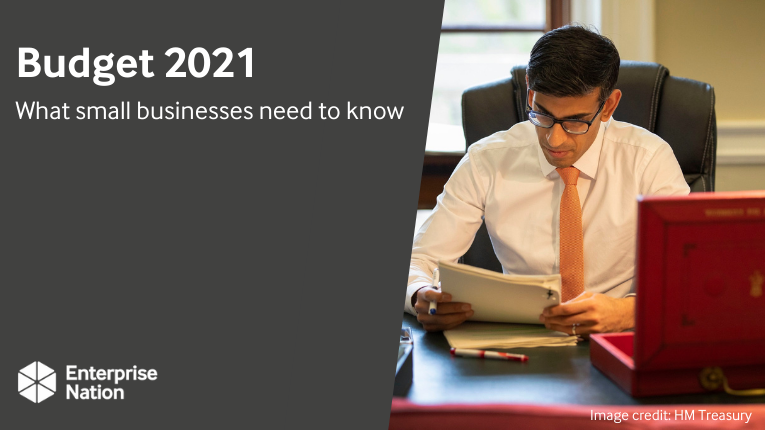Budget 2021: What small businesses need to know

Posted: Thu 4th Mar 2021
Here are the measures of interest to small businesses in chancellor Rishi Sunak's 2021 Budget.
Coronavirus Job Retention Scheme
The furlough scheme has been extended until the end of September 2021.
Employees will continue to receive 80% of their current salary for hours not worked. Employers need to pay National Insurance contributions (NICs) and pensions in April, May and June. From July, the government will introduce an employer contribution towards the cost of unworked hours of 10% in July, 20% in August and 20% in September.
Self-employment Income Support Scheme
The Self Employment Income Support Scheme (SEISS) has been extended to September 2021. The grant now covers 2019-20 tax returns and the government says an extra 600,000 may now be eligible. All other eligibility criteria will remain the same for the fourth grant as the third grant.
The fourth grant, covering February, March and April, will open for applications in late April and close on 31 May 2021. It covers 80% of average trading profits up to £50,000, capped at £7,500.
The fifth grant, covering May, June, July, August and September, will open for applications in late July. People whose turnover has fallen by 30% or more can access the full grant worth 80% of three months' average trading profits up to £50,000 and capped at £7,500. People whose turnover has fallen by less than 30% will receive a 30% grant, capped at £2,850.
There are more details about applying for the fourth and fifth SEISS grants here.
Grants for retail, leisure and hospitality
Businesses in England can access £5bn of new "restart grants".
Non essential retailers can access a grant of up to £6,000 per premises and hospitality, accommodation, leisure, personal care and gym businesses can get up to £18,000.
An additional £425m of discretionary business grant funding will be provided to local authorities to distribute.
VAT reduction for tourism and hospitality
The temporary reduced rate of 5% VAT for goods and services supplied by the tourism and hospitality sector will be extended until 30 September 2021. A 12.5% rate will then apply for six months until 31 March 2022.
Community Ownership Fund
Sunak announced a £150m fund to allow communities to buy pubs, theatres, shops, or local sports clubs to prevent them from closing.
Most bidders will be able to access match funding of £250,000 but in some case, particularly for sports venues that have high costs, £1m will be available.
Business rates
Eligible retail, hospitality and leisure properties in England will continue to receive 100% business rates relief until 30 June 2021. This will be followed by 66% business rates relief from 1 July 2021 to 31 March 2022, capped at £2m per business for properties that were required to be closed on 5 January 2021, or £105,000 per business for other eligible properties.
Nurseries will also qualify for relief in the same way as other eligible properties.
Recovery Loan Scheme
Once other loan schemes such as Bounce Back Loans and the Coronavirus Business Interruption Loan Scheme close, a new Recovery Loan Scheme will be introduced.
From 6 April until 31 December 2021, businesses will be apply for apply for loans and overdrafts between £25,001 and £10m and invoice finance and asset finance between £1,000 and £10m. The government will provide an 80% guarantee to lenders.
Finance terms are up to six years for term loans and asset finance facilities. For overdrafts and invoice finance facilities, terms will be up to three years.
No personal guarantees will be taken on facilities up to £250,000, and a borrower's principal private residence cannot be taken as security.
Help to Grow training scheme
The government will launch a new UK-wide management programme for 30,000 SMEs over three years. It will be delivered through business schools with mentoring from professionals. It will run over 12 weeks with 90% of the costs subsidised by the government.
Another UK-wide scheme will also launch in the autumn to help 100,000 SMEs to use software to improve productivity. It will offer a voucher covering up to half of the costs of approved software up to a maximum of £5,000, and free impartial advice, delivered through an online platform.
Corporation tax
In 2023, the main rate of corporation tax will increase to 25%. A new small profits rate will keep the tax at 19% for businesses with profits of £50,000 or less and a taper above £50,000 will be introduced so that only businesses with profits greater than £250,000 will be taxed at the full 25% rate.
Freeports
Eight new English freeports, which provide businesses with tax reliefs, simplified customs procedures and wider government support, will be based in East Midlands Airport, Felixstowe & Harwich, Humber, Liverpool City Region, Plymouth, Solent, Thames and Teesside. They will operate from late 2021.
Culture and the arts
Arts venues in England, including museums and galleries, will be able to access £400m in funding through the Culture Recovery Fund to help them reopen.
Funding of £18.8m was announced to support local cultural projects in Hartlepool, Carlisle, Wakefield and Yeovil.
'Super-deduction' tax incentive
From 1 April 2021 until 31 March 2023, companies investing in qualifying new plant and machinery assets will be able to claim:
a 130% super-deduction capital allowance on qualifying plant and machinery investments
a 50% first-year allowance for qualifying special rate assets
It will allow companies to cut their tax bill by up to 25p for every £1 they invest.
Apprenticeships grants
The government will extend and increase the payments made to employers in England who hire new apprentices. Employers who hire a new apprentice between 1 April 2021 and 30 September 2021 will receive £3,000 per new hire, compared with £1,500 per new apprentice hire (or £2,000 for those aged 24 and under) under the previous scheme.
Statutory Sick Pay (SSP) Rebate Scheme
Small and medium-sized employers across the UK will continue to be able to reclaim up to two weeks of eligible SSP costs per employee. The full Budget document said "the government will set out steps for closing this scheme in due course".
Future Fund: Breakthrough
A new £375m direct co-investment scheme will be launched by the government to support innovative, R&D-intensive businesses. The British Business Bank will take equity in funding rounds of over £20m led by private investors.
Fuel and alcohol duties
Fuel and alcohol duties will be frozen.
Visas for people from overseas
A new 'scaleup visa' will enable those with a job offer from a recognised UK scale-up to qualify for a fast-track visa.
The government will also review the 'innovator visa' to make it easier for entrepreneurs to obtain a visa to come to the UK.
The Budget included details on various funds and government initiatives for wider projects that could benefit small businesses:
Levelling Up Fund
The Budget announced the publication of the prospectus for the £4.8bn Levelling Up Fund which provides guidance for local areas on how to submit bids for the first round of funding.
The fund will "invest in local infrastructure that has a visible impact on people and their communities" "and drive regeneration in places in need, those facing particular challenges, and areas that have received less government investment in recent years".
UK Infrastructure Bank
Sunak announced that the new UK Infrastructure Bank, which will fund major projects and help deal with climate change, will be based in Leeds. It will have an initial capitalisation of £12bn.
Green savings bond
The new savings product will allow the public to support projects that benefit the environment.
UK Community Renewal Fund
The Budget announced the prospectus for this £220m fund which is focused on investing in skills, community, local business, and supporting people into employment as the UK moves away from using EU funding. The government has identified the government has identified "100 priority places based on an index of economic resilience to receive capacity funding to help them co-ordinate their applications".
Enterprise Nation's reaction
Emma Jones CBE, founder of Enterprise Nation, said: "Today's Budget was strong on support programmes continuing until September, inevitable in its corporation tax hike, but lacking when it comes to a plan to reduce small business dependency on state hand-outs and getting into debt. For enterprise to flourish, start-ups should be encouraged, and small firms given the confidence to grow.
"Today's Budget offered critical support to the self-employed and smallest of firms until September, and a Help to Grow scheme for those with 5+ employees beyond the Autumn.
"We welcome Help to Grow and look forward to working with government to ensure this scheme is relevant for businesses and delivered in an environment in which they already operate i.e. through existing small business networks and private sector advisers.
"We would have liked to see more of an emphasis on ways in which smaller firms can trade their way back to health through making sales at home and abroad. Hopefully this will be delivered through a consumer comeback from the great British public."

